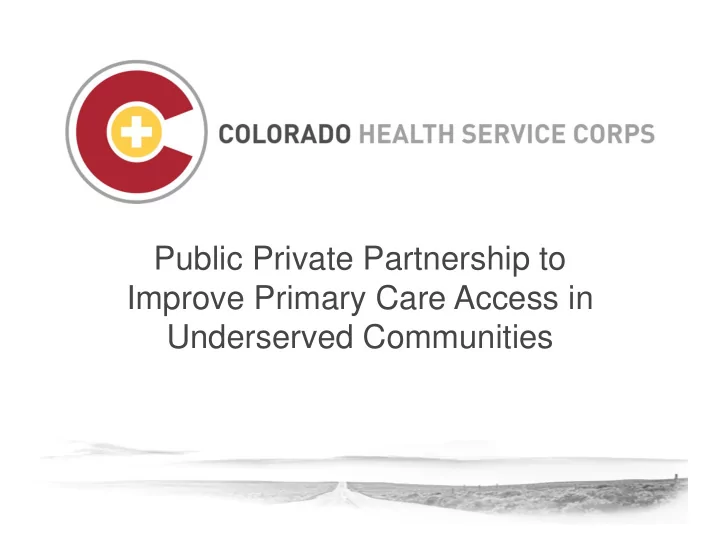

Public Private Partnership to Improve Primary Care Access in Underserved Communities
Primary Care Office Core Functions Assess for primary, oral and mental health provider capacity to determine shortages Administer, promote, and monitor health professional incentive programs that encourage practice in areas determined to have a shortage Provide policy research and support to state officials and nongovernmental organizations on issues of access, workforce and health equity
Colorado Health Service Corps State administered primary care loan repayment practice incentive to care for the underserved Benefits available to medical, oral and mental health professionals practicing primary care Many similarities to the National Health Service Corps but an effort has been made to distinguish the programs where possible
Impetus for Change – 2009 Very small state program Few opportunities to match federal funds Lack of coordination among six other provider loan repayment incentive efforts Emphasis upon the provider debt rather than the access needs of underserved Limited collaboration among interested statewide organizations
Colorado HB 09-1111 and 10-1138 Established the Primary Care Office in statute Expanded the breadth & frequency of assessment Transferred administrative responsibility for the SLRP to the PCO Renamed the program as the “Colorado Health Service Corps” Adjusted state procurement and contracting requirements to better accommodate program
Program Strategy Orienting the goals of the program toward health equity rather than toward the “provider benefit” Though the basis for eligibility of a Health Professional Shortage Area is retained, the relative needs of the community are deemphasized
Program Strategy Program design emphasis on retention Three year commitments standard Full time only Constructing selection criteria that favors candidates who are more likely to be retained
Program Strategy Selection Criteria Investment in the community Employer support Training specific to the needs of the underserved Personal experiences of under service Graduation from Colorado programs
Benefits of Public-Private Partnership independent programs $ 1.00 independent loan repayment investment $ ‐ 0.12 approximate operating costs $ ‐ 0.32 federal & state income tax liability $ 0.52 net incentive benefit to provider
Benefits of Public-Private Partnership state programs $ 1.00 independent loan repayment investment $ ‐ 0.10 approximate operating costs $ 0.90 federal matching funds potential $ 0.00 federal & state income tax liability $ 1.80 net incentive benefit to provider
$0.52 verses $1.80 The provider benefit of state loan repayment, per dollar invested, is more than three times that of other options for primary care practice incentives conducted outside of the Colorado Health Service Corps.
Results Consolidated and organized six state incentive programs with shared, cross ‐ sector decision making Advisory process for stakeholder input on program policy Expanded from 12 providers and $200,000 in annual funding to 220 providers and $3.6 million in annual funding
New Directions Inpatient Mental Health School Based Health Pharmacy (deferred)
Access Equity vs. Health Equity Train Corps members in key aspects of the social determinants model of public health Direct Corps members to become community advocates for social determinants of health interventions Establish Corps members as preceptors and clinical instructors
Steve Holloway steve.holloway@state.co.us Primary Care Office Colorado Department of Public Health and Environment 4300 Cherry Creek Drive South Denver CO 80246 303-692-2466
Recommend
More recommend